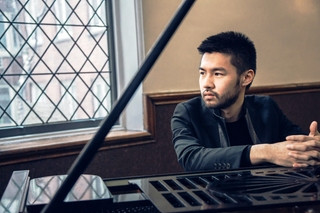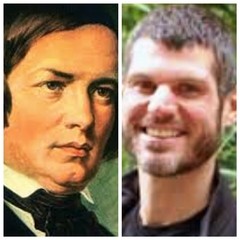|
Back
Knots and Linkages New York
Weill Recital Hall, Carnegie Hall
11/20/2019 -
David Lang: Two selections from memory pieces: wed;cage
Johann Sebastian Bach: Toccata in F-Sharp Minor, BWV 910
Elliott Carter: Two Thoughts About the Piano: I. Intermittences; II. Caténaires
Julia Wolfe: Earring
Sergei Rachmaninoff: Etude-tableau in A Minor; Opus 39, No. 2
Jason Eckhardt: Echoes’ White Veil
Robert Schumann: Kreisleriana, Opus 16
Conrad Tao (Pianist) 
C. Tao
(© Brantley Gutierrez)
“Everything we hear is an echo. Anyone can see that echoes move forward and backward in time, in rings. But not everyone realizes that as a result silence becomes harder and harder for us to grasp — though in itself it is unchanged — because of the echoes pouring through us out of the past, unless we can learn to set them at rest.”
W.S. Merwin (1927-2017), from Echoes’ White Veil
Conrad Tao, to be Webern-ally succinct, is a marvel of nature, and his recital last night was a singular Event. (Capital E)
I was one of the few in the Weill Recital Hall last night who either had not heard him before or was not one of the accidental claque which greeted with applause. Yes, he had performed with the NY Phil and virtually every other orchestra. He creates multi-media events, appeared in David Lang’s transformation of Thomas Bernhard’s The Loser, he is composer, recording artist, an advocate of American music old and new. To me, he was a cypher. To others last night, the Urbana, Illinois-born artist is an icon.
I can see their point. First, the seemingly outrageous form of the recital. To begin with David Lang, continue with Bach, onto Elliott Carter, and finish the first half with a Rachmaninoff Etude-tableau seemed a trick at first.
Then it became clear, David Lang’s short memorial to John Cage was like a series of points, fast repeated notes on all parts of the keyboard. Of course all music is abstract, but this was like a painting by Mondrian or Dubuffet.
Now connect those dots to form a line, a flowing line, two or three lines encircling each other following each other, in a Bach Toccata, and the linkage between the two becomes apparent.
How is that followed. Take the lines intersecting each other, following proceeding with such logic. (Not Classical logic, but the invention of the Baroque), and blow them all up. And you have Elliott Carter’s “intermittence” heading around the keyboard in crazy fashion–finishing a piece which seemed to sum up Bach and Lang together. One line without chords, at supersonic speeds, with different spaces, accents, and no chords whatsoever.
A short piece with two totally different emotions: the right hand at the top tapping out a samba rhythm, the left hand playing a nocturne at the bottom. More like an exercise than anything else. But finish this first half with everything put together. Rachmaninoff’s lush, richly harmonic, fiercely Russian work denies any note which excludes pure emotion.
And how does Conrad Tao play these variegated pieces, linked only with these hypothetical words? Incredibly well.
Technically, one can find no fault. He owns the keyboard, his fingers are as animated as the music deserves. The Lang was stolid, the Bach was played with a minimum of pedal, but it was all piano, no harpsichord similitude.
The two Carter works, written near the composer’s centenary, seemed impossible to play, yet Mr. Tao took the music in his stride. And when one thinks of the lanky Rachmaninoff with the enormous hand-span, one doesn’t picture Mr. Tao, who gave it all the muscularity needed.
This was not a first-half buffet of music. It was a triptych (or sextych) of palettes: icons and sculptures and old Russian salons, somehow held together.

R. Schumann/J. Eckhardt
After the intermission, the now t-shirted Mr. Tao gave a short introduction for Jason Eckhardt’s work, based on the W.S. Merwin prose-poem, Echoes’ White Veil. This to be followed by Robert Schumann’s Kreisleriana.
Now on the surface, no two composers could be more different. Mr. Eckhardt was a Heavy Metal/jazz guitarist. Discovering the music of Anton Webern, he entered a new portal for creation, and his music presently incorporates...well, everything. Robert Schumann was...uh, Robert Schumann. No explanation necessary.
Yet we had a link, almost a bonding in Merwin’s poem, a few lines of which are quoted above. That is, the relationship between sound and silence, what that other Tao, Tao Te Ching sees as the Yin and Yang, and old-fashioned writers referred to as Masculine-active and Feminine-passive.
I had heard Echoes’ Veil played before that equal miracle of nature, Taka Kigawa, yet, without any printed reference to the poem, the work was nerve-rackingly difficult to comprehend, an endless tumbling of the piano, seemingly formless. Under Mr. Tao’s fingers, the sometimes chaotic beginnings were impressive (oh hell, miraculously impressive), hinting at jazz, hinting of tone-rows. Yet, not out of the chaos, but in opposition, we had a 30-seconds of silence...and the quiet Feldman-like creeping of notes from that silence. Part breathing, part breathless, ending nearly in the Paul Simon sound of silence.
With no break (except a lengthy caesura), Mr. Tao launched into Robert Schumann’s own Yin and Yang, the opposition of the impetuous Florestan and the poetic more passive Eusebius. The composer felt that both were part of his own character. (Incidentally, I had read a questionable psychoanalysis of the composer noting his bisexuality.
Of course, like physics, all art depends on velocity and resistance, but here Mr. Tao may well have consciously placed these two works together.
Like the other pieces in this gorgeous recital, Mr. Tao played the Kreisleriana with unerring speed, with dreamy melody, and when necessary with euphoric limpidity.
Harry Rolnick
|